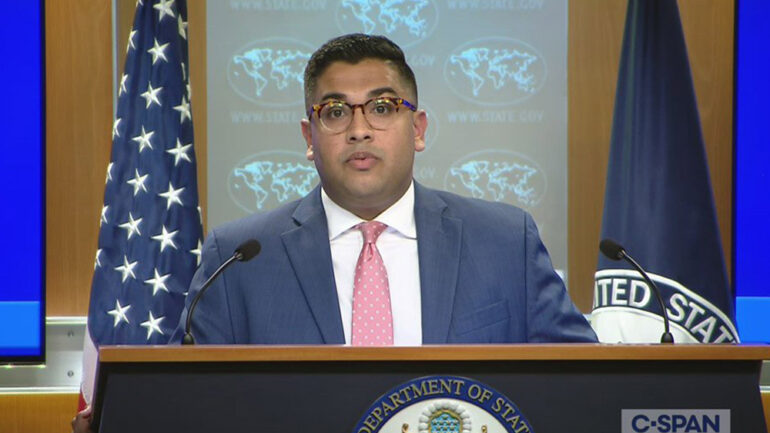The U.S. will engage with the Taliban if it serves American interests, according to Vedant Patel, a spokesperson for the State Department.
Patel made the remarks in response to a question from reporters at a briefing on Tuesday.
“I’m not aware of any travel to Afghanistan by any undersecretary, but let me just say that when it comes to our engagements with the Taliban, we engage when it is in the United States interest to do so,” he said.
“This is the best way to not just protect U.S. national interests but also support the Afghan people. Engagement allows us to speak directly with the Taliban, and it’s an opportunity for us to continue to press for the immediate and unconditional release of U.S. nationals in Afghanistan including those who we have determined to be wrongfully detained. We’ll also use those opportunities to directly talk about the Taliban’s commitments to counterterrorism, and of course, as always, human rights is also on the agenda,” Patel added.
Patel described engagement as an opportunity for the U.S. to press for the immediate and unconditional release of U.S. nationals in Afghanistan and to discuss the Taliban’s commitments to counterterrorism. “Human rights are also always on the agenda,” he added.
Observers, particularly women’s rights activists and human rights advocates, closely scrutinize any potential interaction between the U.S. and the Taliban, given the group’s widespread human rights violations and failure to meet international expectations for forming an inclusive government.
“The green light for U.S. interaction with the Taliban was given with the signing of the Doha Agreement,” said Nasir Ahmad Taraki, a political analyst. “The Taliban do not believe in anything; human rights and human values have no meaning for this group. After coming to power in Afghanistan, except from oppression and brutality, they have not given anything else to the people.”
Women’s rights activists have criticized the U.S. policy regarding the Taliban, indicating that engagement could legitimize the group’s human rights violations in Afghanistan. “The U.S., which considers itself a supporter of democracy and human rights, should not engage with human rights violators like the Taliban. U.S. engagement with the Taliban means legitimizing human rights violations and undermining women’s human values in Afghanistan,” said Azita Nazami, a women’s rights activist.
The international community’s main demands include respecting human rights, lifting restrictions on women and girls, forming an inclusive government, and addressing counter-terrorism threats.




